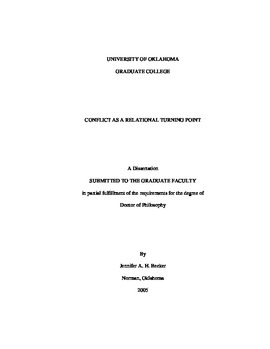| dc.contributor.advisor | O'Hair, H. Dan, | en_US |
| dc.contributor.author | Becker, Jennifer A. H. | en_US |
| dc.date.accessioned | 2013-08-16T12:19:38Z | |
| dc.date.available | 2013-08-16T12:19:38Z | |
| dc.date.issued | 2005 | en_US |
| dc.identifier.uri | https://hdl.handle.net/11244/834 | |
| dc.description.abstract | Turning points, which represent changes that transform a relationship, are consistent with a dialectical view of relationships (Baxter & Montgomery, 1996). Previous research has presumed that turning points produce either positive or negative outcomes for relationships, generally in terms of commitment or closeness. Further, extant research has not considered individual differences in the experience of turning points. This study investigated how conflict functions as a turning point, with attention to the antecedents and outcomes of turning points. Participants were 284 individuals in romantic relationships. Almost half of participants reported a combination of positive and negative outcomes resulting from their conflict turning point. As the length of participants' relationships increased, they were less likely to perceive that relational uncertainty and jealousy contributed to their conflict turning point. The constant comparative method showed that participants in early-stage relationships were more likely to perceive alcohol as contributing to their conflict turning point, while participants in more established relationships were more likely to perceive major life changes as contributing to their conflict turning point. The constant comparative method also revealed that outcomes of conflict turning points were aggravated emotions and demonstrations of care and concern. Additionally, individuals high in the solution-oriented conflict style were more likely to report conflict as a turning point with primarily constructive outcomes for their relationship, while individuals who felt persecuted were more likely to report conflict as a turning point with primarily destructive outcomes for their relationship. Finally, Machiavellians were more likely to strategically manage conflict episodes to avoid a turning point. Implications of these findings are noted. | en_US |
| dc.format.extent | x, 178 leaves ; | en_US |
| dc.subject | Interpersonal conflict. | en_US |
| dc.subject | Man-woman relationships. | en_US |
| dc.subject | Psychology, Social. | en_US |
| dc.subject | Speech Communication. | en_US |
| dc.subject | Couples Psychology. | en_US |
| dc.title | Conflict as a relational turning point. | en_US |
| dc.type | Thesis | en_US |
| dc.thesis.degree | Ph.D. | en_US |
| dc.thesis.degreeDiscipline | Department of Communication | en_US |
| dc.note | Adviser: H. Dan O'Hair. | en_US |
| dc.note | Source: Dissertation Abstracts International, Volume: 66-01, Section: A, page: 0028. | en_US |
| ou.identifier | (UMI)AAI3162828 | en_US |
| ou.group | College of Arts and Sciences::Department of Communication | |
